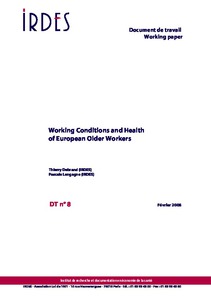Working conditions and health of European older workers
"Working conditions have greatly evolved in recent decades in developed countries. This evolution has been accompanied with the appearance of new forms of work organisation that may be sources of stress and health risk for older workers. As populations are ageing, these issues are particularly...
| Main Authors: | , |
|---|---|
| Institution: | ETUI-European Trade Union Institute |
| Format: | TEXT |
| Language: | English |
| Published: |
Paris
2008
IRDES |
| Subjects: | |
| Online Access: | https://www.labourline.org/KENTIKA-19291383124910195659-Working-conditions-and-health-.htm |
| Summary: | "Working conditions have greatly evolved in recent decades in developed countries. This evolution has been accompanied with the appearance of new forms of work organisation that may be sources of stress and health risk for older workers. As populations are ageing, these issues are particularly worrying in terms of the health, labour force participation and Social Security expenditure.
This paper focuses on the links between quality of employment and the health of older workers, using the Share 2004 survey. Our research is based on two classical models: the Demand-Control model of Karasek and Theorell (1991) and the Effort-Reward Imbalance model of Siegrist (1996), which highlight three main dimensions: Demand that reflects perceived physical pressure and stress due to a heavy work load; Control that refers to decision latitude at work and the possibilities to develop new skills; and Reward that corresponds to the feeling of receiving a correct salary relatively to efforts made, of having prospects for personal progress and receiving deserved recognition. These models also take into account the notion of support in difficult situations at work and the feeling of job security.
Our estimations show that the health status of older workers is related to these factors. Fairly low demand levels and a good level of reward are associated with a good health status, for both men and women. Control only influences the health status of women. Lastly, the results reveal the importance on health of a lack of support at work and the feeling of job insecurity; regardless of gender; these two factors are particularly related to the risk of depression. Thus health status and working conditions are important determinants of the labour force participation of older workers." |
|---|---|
| Physical Description: | 21 p. Digital |

